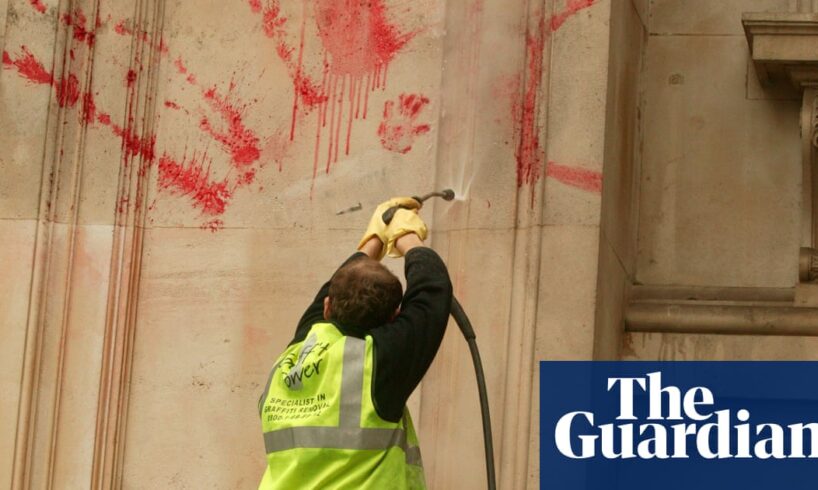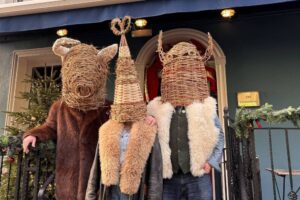
Ministers are pushing through powers to photograph, name and shame offenders who have been ordered to complete unpaid community work in England and Wales.
The sentencing bill, now moving through parliament, will for the first time give probation officers “a legal power” to take and publish the names and pictures of individuals ordered by courts to tidy grass verges, litter-pick or scrub graffiti.
The move, pushed through by the government “to build confidence” in community sentences, has sparked concern that it could instead be used to humiliate and embarrass offenders’ partners and children.
Martin Jones, HM inspector of probation, said it could result in more offenders dropping out. He said: “I am very concerned about seeking to name and shame people undertaking unpaid work.
“I think it could act as a disincentive to rehabilitation and some may refuse to turn up. If offenders are turning up to do the work I do not see a reason why they should also have their images published, particularly when the evidence shows that reintegration back into communities and employment are key to preventing reoffending.”
Ian Lawrence, the general secretary of Napo, the probation officers’ union, said the change would bring shame upon families of offenders, particularly children. He said: “This proposed policy serves no value to the rehabilitation of offenders but could have potentially devastating effects on innocent family members, namely children.
“It seems to only serve as a form of humiliation, not just for the offender but those around them. It also could potentially place people on unpaid work at risk, especially if it involves those that commit sexual offending.”
It comes as the government plans to rapidly expand “community payback” as an alternative to custodial sentences, as part of a plan to divert offenders away from overcrowded prisons.
Offenders can be sentenced to an “unpaid work requirement” (UWR) as a way to atone for crimes, under both community orders and suspended sentence orders.
The work can be imposed for between 40 and 300 hours and requires an offender, usually wearing a hi-vis jacket printed with the words “community payback”, to undertake projects within the local area.
According to a Ministry of Justice policy paper: “To build confidence in community sentences and increase the visibility and transparency of community payback, we will publish the names and photographs of individuals subject to an unpaid work requirement.”
Officials believe that publishing the names and photos of those subject to a UWR will demonstrate to the public that justice is being delivered.
To do this, probation officers will be given “a legal power to take and publish the names and photographs of individuals subject to an UPW requirement”.
The policy paper said: “During their initial appointment, practitioners will assess whether an individual’s circumstances pose a risk to themselves or others that justifies an exemption.”
Nearly 5m hours of unpaid work was carried out in the year to April 2024. A Ministry of Justice report into unpaid work last year found that many offenders felt “stigma and shame” because they were asked to wear hi-vis vests.
The report said: “People on probation and supervisors thought, in particularly public areas, having to wear the branded high-visibility vests could impact compliance.”
skip past newsletter promotion
Our morning email breaks down the key stories of the day, telling you what’s happening and why it matters
Privacy Notice: Newsletters may contain information about charities, online ads, and content funded by outside parties. If you do not have an account, we will create a guest account for you on theguardian.com to send you this newsletter. You can complete full registration at any time. For more information about how we use your data see our Privacy Policy. We use Google reCaptcha to protect our website and the Google Privacy Policy and Terms of Service apply.
after newsletter promotion
The government announced plans earlier this month to hand out thousands more unpaid work orders as part of a plan to release criminals into the community on tags.
A statement said: “This includes working with local authorities to determine how offenders could give back to their communities, whether by removing graffiti or cleaning up rubbish.”
Campbell Robb, the chief executive of Nacro, the social justice charity that works with offenders, said the government was making a grave mistake.
He said: “Naming and shaming those on community payback doesn’t deliver justice. Instead, it risks pushing people further to the margins, making it harder for them to find work, rebuild their lives and move away from crime.
“Stable housing, access to recovery, employment opportunities and wellbeing services are proven to reduce reoffending. If we want to break the cycle, we must invest in people’s potential – not just punish their past.”
Some offenders will be exempt from having their names and photographs published. Officials said these exemptions would be set out in legislation at a later date.
A Ministry of Justice spokesperson said: “Unpaid work forces offenders to publicly atone for their crimes and give back to the communities they have wronged. It is punishment that works.
“Through the sentencing bill, we will increase the visibility of this sentence even further and allow the public to see justice being served. Anyone who refuses to comply faces a return to court or even time behind bars.”





